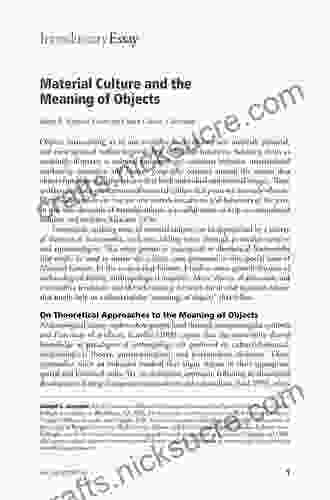How Economics Shapes Science: An Exploration of the Interplay between Resources and Discovery


Science and economics, two seemingly disparate fields, are inextricably linked in ways that profoundly shape the course of human progress. Economics, the study of resource allocation and decision-making, exerts a powerful influence on the development, dissemination, and application of scientific knowledge. This essay explores the multifaceted relationship between economics and science, examining how economic factors mold scientific research, innovation, and the impact of scientific discoveries on society.
4.2 out of 5
| Language | : | English |
| File size | : | 4097 KB |
| Text-to-Speech | : | Enabled |
| Screen Reader | : | Supported |
| Word Wise | : | Enabled |
| Print length | : | 384 pages |
Economic Considerations in Scientific Research
Scientific research is a resource-intensive endeavor. Conducting experiments, acquiring equipment, and funding researchers all require significant financial investment. Economic factors play a pivotal role in determining the allocation of these resources:
1. Funding:
The availability of funding is crucial for scientific research. Government grants, industry sponsorship, and private donations are the primary sources of funds. Economic conditions, such as government budgets, corporate profits, and philanthropic giving, directly impact the availability of funding for scientific research.
2. Cost-Benefit Analysis:
When allocating resources, scientists and funding agencies consider the potential benefits and costs of research proposals. Economic factors, such as the potential return on investment in a particular research area, influence these evaluations.
3. Prioritization:
Economic considerations can also shape the prioritization of scientific research. Governments and funding agencies often allocate resources to research areas that are deemed to have the greatest potential for economic growth or societal impact.
Economic Impact of Scientific Discoveries
Scientific discoveries have profound economic consequences:
1. Technological Innovations:
Scientific breakthroughs often lead to technological innovations that drive economic growth. For example, the development of transistors and integrated circuits in the 20th century revolutionized the electronics industry, creating vast economic opportunities.
2. Improved Productivity:
Scientific advancements can enhance productivity by providing new tools, techniques, and materials. For example, the development of genetic engineering has significantly increased agricultural productivity, reducing food costs and improving global food security.
3. Economic Diversification:
Scientific discoveries can lead to the creation of new industries and economic diversification. For instance, the development of renewable energy technologies has created new job opportunities and reduced dependence on fossil fuels.
Influence of Economics on Scientific Dissemination
Economics also shapes how scientific knowledge is disseminated and shared:
1. Scientific Publishing:
Scientific publishing is vital for the dissemination of research findings. However, access to scientific journals and publications can be limited by paywalls and subscription fees. Economic factors, such as the cost of publishing and the availability of open access models, influence the accessibility of scientific knowledge.
2. Scientific Collaboration:
Economic incentives can promote or hinder scientific collaboration. Funding opportunities, grant competitions, and industry partnerships can create incentives for scientists to work together. However, economic competition can also lead to secrecy and limited sharing of research results.
Economic Impact of Scientific Education
Investing in scientific education has substantial economic benefits:
1. Higher Productivity:
Individuals with strong scientific literacy are better equipped to contribute to the knowledge economy and drive innovation. They can develop new products, processes, and technologies that enhance productivity and economic growth.
2. Workforce Development:
Science education is essential for developing a skilled workforce that can meet the demands of the 21st century economy. Scientific knowledge and skills are necessary for jobs in various industries, including healthcare, manufacturing, and technology.
3. Innovation and Entrepreneurship:
Science education fosters creativity, critical thinking, and problem-solving skills, which are vital for innovation and entrepreneurship. By equipping individuals with these skills, science education contributes to economic growth and job creation.
Policy Implications
Understanding the interplay between economics and science has important policy implications:
1. Funding and Investment:
Governments should prioritize funding for scientific research that addresses critical societal challenges and has the potential for economic growth. This includes investments in基础研究, applied research, and technology transfer.
2. Education and Workforce Development:
Investing in science education at all levels is essential for developing a knowledge-based economy. This includes improving access to scientific education, promoting diversity in science, and providing opportunities for lifelong learning.
3. Intellectual Property and Innovation:
Policymakers should create an intellectual property system that balances the need to protect the rights of inventors with the need to promote the dissemination and commercialization of scientific discoveries.
Economics and science are intertwined in a complex and dynamic relationship. Economic factors mold scientific research, dissemination, and impact, while scientific discoveries shape economic growth and societal well-being. By understanding this interplay, policymakers, researchers, and the public can harness the power of economics to advance scientific progress and create a more prosperous and sustainable future.
4.2 out of 5
| Language | : | English |
| File size | : | 4097 KB |
| Text-to-Speech | : | Enabled |
| Screen Reader | : | Supported |
| Word Wise | : | Enabled |
| Print length | : | 384 pages |
Do you want to contribute by writing guest posts on this blog?
Please contact us and send us a resume of previous articles that you have written.
 Fiction
Fiction Non Fiction
Non Fiction Romance
Romance Mystery
Mystery Thriller
Thriller SciFi
SciFi Fantasy
Fantasy Horror
Horror Biography
Biography Selfhelp
Selfhelp Business
Business History
History Classics
Classics Poetry
Poetry Childrens
Childrens Young Adult
Young Adult Educational
Educational Cooking
Cooking Travel
Travel Lifestyle
Lifestyle Spirituality
Spirituality Health
Health Fitness
Fitness Technology
Technology Science
Science Arts
Arts Crafts
Crafts DIY
DIY Gardening
Gardening Petcare
Petcare Jennifer Shannon
Jennifer Shannon Abdul Foster
Abdul Foster Nick Holt
Nick Holt Barry Dainton
Barry Dainton Pearson Education
Pearson Education Adam H Balen
Adam H Balen Alifya And Umesh Mohite
Alifya And Umesh Mohite Goodman Publishing
Goodman Publishing E P Marcellin
E P Marcellin Sheila Lamb
Sheila Lamb Michael Baigent
Michael Baigent Jeremy Shinewald
Jeremy Shinewald Miranda Kenneally
Miranda Kenneally Adam Galinsky
Adam Galinsky Jimmy Houston
Jimmy Houston Alan Robertson
Alan Robertson Steve Griffith
Steve Griffith Asato Asato
Asato Asato Douglas W Hubbard
Douglas W Hubbard Glen Finland
Glen Finland Gil Capps
Gil Capps Adam D Scott
Adam D Scott Aiden Thomas
Aiden Thomas Conrad Bauer
Conrad Bauer Brian L Gorman
Brian L Gorman Sam J Miller
Sam J Miller Emily Suzanne Clark
Emily Suzanne Clark Marie Cirano
Marie Cirano John Taylor
John Taylor Laurie Chaikind Mcnulty Lcsw C
Laurie Chaikind Mcnulty Lcsw C Fumio Sasaki
Fumio Sasaki Jennifer Greene
Jennifer Greene Adam Benshea
Adam Benshea George J Hademenos
George J Hademenos Cassandra Eason
Cassandra Eason Mark Strom
Mark Strom Jane Gross
Jane Gross Tamora Pierce
Tamora Pierce Colin Hunter
Colin Hunter Todd Graves
Todd Graves Fred Fields
Fred Fields Brad Brewer
Brad Brewer Tim Jarvis
Tim Jarvis Programming Languages Academy
Programming Languages Academy Stefan Ball
Stefan Ball Sasha Abramsky
Sasha Abramsky Christopher Monahan
Christopher Monahan Carl Jones
Carl Jones John Hancock
John Hancock Sophie Mccartney
Sophie Mccartney Michelle Hodkin
Michelle Hodkin Amelia Whitmore
Amelia Whitmore Sean Lewis
Sean Lewis G Bailey
G Bailey Sarah Luddington
Sarah Luddington Phil Gaimon
Phil Gaimon John Caig
John Caig Shannon Hale
Shannon Hale Ron Jones
Ron Jones Anthony Wilkenson
Anthony Wilkenson Jennifer Ackerman
Jennifer Ackerman Marvin Valerie Georgia
Marvin Valerie Georgia Seth Kugel
Seth Kugel Scott Meyers
Scott Meyers Hans C Ohanian
Hans C Ohanian Kel Carpenter
Kel Carpenter Abby Haight
Abby Haight Scott Parsons
Scott Parsons Abhishek V R
Abhishek V R Ryan Smithson
Ryan Smithson Michael Crawley
Michael Crawley Allan Sand
Allan Sand Leigh Bardugo
Leigh Bardugo Brigitte Jordan
Brigitte Jordan Achille Rubini
Achille Rubini Sheldon Axler
Sheldon Axler Scott Butler
Scott Butler Aaron Reed
Aaron Reed Steve Rosenberg
Steve Rosenberg Bobby Reyes
Bobby Reyes Al Yellon
Al Yellon Lynn Rush
Lynn Rush Debbie Ford
Debbie Ford Chashiree M
Chashiree M Rachael Ray
Rachael Ray Winifred Conkling
Winifred Conkling Abby Sunderland
Abby Sunderland Rania Abouzeid
Rania Abouzeid Jeremy Paxman
Jeremy Paxman Adam Lazarus
Adam Lazarus Lindsey Ellison
Lindsey Ellison Ada Calhoun
Ada Calhoun Sean Mcmanus
Sean Mcmanus Kit Bauman
Kit Bauman Arthur Turrell
Arthur Turrell Lisa Robertson
Lisa Robertson Chaz Scoggins
Chaz Scoggins Agustin Fuentes
Agustin Fuentes Abraham Silberschatz
Abraham Silberschatz Ian Mcleod
Ian Mcleod Kate Rope
Kate Rope Michael N Mitchell
Michael N Mitchell Claire Ahn
Claire Ahn Carmen Moreno
Carmen Moreno Clara Shaper
Clara Shaper Lisa Heffernan
Lisa Heffernan Edward J Larson
Edward J Larson Phil Boyle
Phil Boyle Reinette Biggs
Reinette Biggs Robert Fritz
Robert Fritz Aliza Green
Aliza Green Melodie M Davis
Melodie M Davis Abby Mcallister
Abby Mcallister Shuai Huang
Shuai Huang Rosie Pope
Rosie Pope Taylan Hoca
Taylan Hoca Thubten Yeshe
Thubten Yeshe Jeremy Roenick
Jeremy Roenick Pamela Druckerman
Pamela Druckerman Lucio Russo
Lucio Russo Kathy Koch Phd
Kathy Koch Phd Erik Scott De Bie
Erik Scott De Bie Chris Worfolk
Chris Worfolk Barry Robinson
Barry Robinson Jay Ruud
Jay Ruud Abridged Ed Edition Kindle Edition
Abridged Ed Edition Kindle Edition Felice Fox
Felice Fox Winston Chang
Winston Chang Richard Langer
Richard Langer Stuart Firestein
Stuart Firestein Sarah Maslin Nir
Sarah Maslin Nir Renda Dionne Madrigal
Renda Dionne Madrigal James Heberd
James Heberd Christopher S Stewart
Christopher S Stewart Phong Thong Dang
Phong Thong Dang Timothy Phelps
Timothy Phelps Barbara Fox
Barbara Fox Barbara Natterson Horowitz
Barbara Natterson Horowitz Scott Carney
Scott Carney Ralph Villiger
Ralph Villiger Stephanie Puglisi
Stephanie Puglisi Gerry Donohue
Gerry Donohue Larry Carpenter
Larry Carpenter Meg Keys
Meg Keys Adam J Cox
Adam J Cox Blake D Bauer
Blake D Bauer Adam Freeman
Adam Freeman Wayne Westcott
Wayne Westcott Eugene H Merrill
Eugene H Merrill Christopher Knight
Christopher Knight Laura Peyton Roberts
Laura Peyton Roberts Paul Schneider
Paul Schneider Eze Ugbor
Eze Ugbor Martha Gellhorn
Martha Gellhorn Mary Wong
Mary Wong Charlie Barker
Charlie Barker Aaron J Perry
Aaron J Perry Paul Chiasson
Paul Chiasson Dan Morris
Dan Morris Tim Larkin
Tim Larkin Horace Kephart
Horace Kephart Chiara Giuliani
Chiara Giuliani Norton Juster
Norton Juster Aaron Oster
Aaron Oster Tomos Forrest
Tomos Forrest Jim Morekis
Jim Morekis Jon Butterworth
Jon Butterworth Irakli Makharadze
Irakli Makharadze Arthur Atchabahian
Arthur Atchabahian Papus
Papus Gladys Chepkirui Ngetich
Gladys Chepkirui Ngetich Vivian Gussin Paley
Vivian Gussin Paley Sarah K L Wilson
Sarah K L Wilson Collins Kids
Collins Kids Andrew Campanella
Andrew Campanella Ariana Eagleton
Ariana Eagleton Andy Dumas
Andy Dumas Heather Lynn
Heather Lynn Charles L Byrne
Charles L Byrne Jennifer L Hunt
Jennifer L Hunt Corinne Andrews
Corinne Andrews Chris Jericho
Chris Jericho Rolf Mowatt Larssen
Rolf Mowatt Larssen Dan Shideler
Dan Shideler Catherine Ryan Hyde
Catherine Ryan Hyde Cosmas Inyang
Cosmas Inyang Casey Robson
Casey Robson Emily K Neuburger
Emily K Neuburger Aaron James
Aaron James Brandon Neice
Brandon Neice Abigail Marshall
Abigail Marshall George John Romanes
George John Romanes Louise Pickford
Louise Pickford Adam Braus
Adam Braus Zoe Hamlet Silva
Zoe Hamlet Silva Linford Stutzman
Linford Stutzman Moon Ho Jung
Moon Ho Jung Gail Buckland
Gail Buckland Adam Frank
Adam Frank Neil Oliver
Neil Oliver Abbi Glines
Abbi Glines Maxine Levaren
Maxine Levaren Dan Werb
Dan Werb Mark Januszewski
Mark Januszewski Kim Gosselin
Kim Gosselin Christian Beamish
Christian Beamish Adam Kimelman
Adam Kimelman Sherri Granato
Sherri Granato An American Citizen
An American Citizen Michael Gruenbaum
Michael Gruenbaum Richard Martin
Richard Martin Jack Cavanaugh
Jack Cavanaugh Harley Rustad
Harley Rustad Aaron Hahn
Aaron Hahn Sharon Boyd
Sharon Boyd O Thomas Gift
O Thomas Gift Claire Santry
Claire Santry Ron Hotchkiss
Ron Hotchkiss Abu Mussab Wajdi Akkari
Abu Mussab Wajdi Akkari Gayle Forman
Gayle Forman Linda Sarris
Linda Sarris Domenica Marchetti
Domenica Marchetti Annie Nicholas
Annie Nicholas Rose Ann Hudson
Rose Ann Hudson Tali Edut
Tali Edut Sally Clarkson
Sally Clarkson Jennifer Finney Boylan
Jennifer Finney Boylan Emily J Taylor
Emily J Taylor Natasha Preston
Natasha Preston Martha C Nussbaum
Martha C Nussbaum Stephen Abbott
Stephen Abbott Carolyn Jessop
Carolyn Jessop Gloria Atanmo
Gloria Atanmo Dawson Church
Dawson Church Cornel West
Cornel West William Hamilton Gibson
William Hamilton Gibson Michael Johnson
Michael Johnson Farah Shabazz Ii
Farah Shabazz Ii Chuck Callaway
Chuck Callaway Barbara Decker
Barbara Decker Ed Engle
Ed Engle Bathroom Readers Institute
Bathroom Readers Institute Uri Bram
Uri Bram Virginia Smith Harvey
Virginia Smith Harvey Irene Lewis Mccormick
Irene Lewis Mccormick Susan Walton
Susan Walton Abigail Owen
Abigail Owen Jessie Hartland
Jessie Hartland Achref Hassini
Achref Hassini Tom Migdalski
Tom Migdalski Kayla Cottingham
Kayla Cottingham Gavin D J Harper
Gavin D J Harper Dr Robert Pasahow
Dr Robert Pasahow Iain Highfield
Iain Highfield Aaron Mccargo
Aaron Mccargo Ann Mariah Cook
Ann Mariah Cook Marlene Wagman Geller
Marlene Wagman Geller T L Christianson
T L Christianson Aaron Lee Johnson
Aaron Lee Johnson Al Barkow
Al Barkow Stephanie Zeiss
Stephanie Zeiss Hillary Allen
Hillary Allen Brian Hoggard
Brian Hoggard Aaron Graves
Aaron Graves Ian Davis
Ian Davis Brian Greene
Brian Greene Lillian Cumic
Lillian Cumic Nancy Mohrbacher
Nancy Mohrbacher Abigail Hair
Abigail Hair Kirk Bailey
Kirk Bailey Zoyla Arana
Zoyla Arana Garrett Mcnamara
Garrett Mcnamara Laura Ray
Laura Ray Achim K Krull
Achim K Krull Abinash Das
Abinash Das Kaylynn Flanders
Kaylynn Flanders Ned Johnson
Ned Johnson Christina Hoff Sommers
Christina Hoff Sommers Lucy Letcher
Lucy Letcher Gerald A Voorhees
Gerald A Voorhees Man Kam Lo
Man Kam Lo Thomas Wilson
Thomas Wilson Pat Chargot
Pat Chargot Paula Deen
Paula Deen Al Desetta
Al Desetta Steve Roper
Steve Roper Katie Lear
Katie Lear Ken Springer
Ken Springer Daphne Poltz
Daphne Poltz Alicia C Simpson
Alicia C Simpson Robert Reid
Robert Reid Jasna Tuta
Jasna Tuta Dick Edie
Dick Edie John Kean
John Kean Matt Owens
Matt Owens Tom Mccarthy
Tom Mccarthy Aaron Blight
Aaron Blight Scott Shaw
Scott Shaw Sissy Goff
Sissy Goff Beth Newell
Beth Newell Richelle Mead
Richelle Mead Benjamin Roberts
Benjamin Roberts Helen C Rountree
Helen C Rountree Monica Sorrenson
Monica Sorrenson Terry Palechuk
Terry Palechuk Adam Boduch
Adam Boduch Ken Retallic
Ken Retallic Laura Gao
Laura Gao Shari Eskenas
Shari Eskenas Ilsa J Bick
Ilsa J Bick Drew Harris
Drew Harris Deborah Beck Busis
Deborah Beck Busis Jim Willis
Jim Willis Rory Miller
Rory Miller Randy Walker
Randy Walker Dmv Test Bank
Dmv Test Bank David G Brown
David G Brown Tomi Adeyemi
Tomi Adeyemi Michael L Bloomquist
Michael L Bloomquist Garo Yepremian
Garo Yepremian Jeff Bauman
Jeff Bauman Walter Browder
Walter Browder Alvin Alexander
Alvin Alexander Randall Hyde
Randall Hyde Maya Lang
Maya Lang Lois G Schwoerer
Lois G Schwoerer Darrin Bergman
Darrin Bergman Lisa M Schab
Lisa M Schab Jay Dawes
Jay Dawes Abby Hafer
Abby Hafer David Winner
David Winner Lavinia Collins
Lavinia Collins T L Lowery
T L Lowery Chella Quint
Chella Quint Amber Fox
Amber Fox Andrea M Nelson Royes
Andrea M Nelson Royes Carley Roney
Carley Roney Ronald Kaine
Ronald Kaine Gisle Solhaug
Gisle Solhaug R L Stine
R L Stine Steven Alan Childress
Steven Alan Childress Adam Enaz
Adam Enaz Charles C Patrick
Charles C Patrick Adam Chandler
Adam Chandler Christophe Jaffrelot
Christophe Jaffrelot Rob Gray
Rob Gray Liza Angela
Liza Angela Michel Roy
Michel Roy Christopher Black
Christopher Black Genius Reads
Genius Reads David Lipsky
David Lipsky Deborah Madison
Deborah Madison Og Mandino
Og Mandino Sarah Moore
Sarah Moore Craig Timberg
Craig Timberg David Rensin
David Rensin Jason Korol
Jason Korol Debbie Elicksen
Debbie Elicksen Miriam Forman Brunell
Miriam Forman Brunell Rachel Caine
Rachel Caine Richard Sattora
Richard Sattora Lisa Latimer
Lisa Latimer Stephen A Mitchell
Stephen A Mitchell Laura Sebastian
Laura Sebastian Emma Crewe
Emma Crewe Amber Domoradzki
Amber Domoradzki Joe Simpson
Joe Simpson Matt Warshaw
Matt Warshaw Rick Sekuloski
Rick Sekuloski Abigail Melton
Abigail Melton Betsy Miller
Betsy Miller Lynn Alley
Lynn Alley Alicia Silverstone
Alicia Silverstone Teresa Finney
Teresa Finney Erika Fatland
Erika Fatland J Robert King
J Robert King Bruce Van Brunt
Bruce Van Brunt Helen Scales
Helen Scales Laurence Steinberg
Laurence Steinberg Axie Oh
Axie Oh Gregor Clark
Gregor Clark Rex Ogle
Rex Ogle Lisa Pineda
Lisa Pineda Adam Becker
Adam Becker Megan Lane
Megan Lane Bill Loguidice
Bill Loguidice Elisabetta Viggiani
Elisabetta Viggiani Charles Fernyhough
Charles Fernyhough Aaron Mahnke
Aaron Mahnke Curt Lader
Curt Lader David Warriner
David Warriner Abigail Pogrebin
Abigail Pogrebin Lin Wellford
Lin Wellford Katrina Kahler
Katrina Kahler Adam Koch
Adam Koch Joy Neighbors
Joy Neighbors Peter David
Peter David Steve Mcmenamin
Steve Mcmenamin Xiuhtezcatl Martinez
Xiuhtezcatl Martinez Lenyfer Garrido
Lenyfer Garrido Judi Kesselman Turkel
Judi Kesselman Turkel Vince Kotchian
Vince Kotchian Jessica Hepburn
Jessica Hepburn David Simon
David Simon Lisa M Given
Lisa M Given Jack Moore
Jack Moore Louise Thaden
Louise Thaden William Deresiewicz
William Deresiewicz Roman Dial
Roman Dial Tom Rosenbauer
Tom Rosenbauer Abigail Hing Wen
Abigail Hing Wen Carl Vernon
Carl Vernon Andy Couturier
Andy Couturier Richard Lighthouse
Richard Lighthouse Abbas Kazerooni
Abbas Kazerooni Peter Sagal
Peter Sagal Maureen Duffin Ward
Maureen Duffin Ward Vivienne Sanders
Vivienne Sanders Amby Burfoot
Amby Burfoot Sorin Dumitrascu
Sorin Dumitrascu Jeremy Miles
Jeremy Miles Vikas Kakwani
Vikas Kakwani Tom Jackson
Tom Jackson Mikki Daughtry
Mikki Daughtry Barbara A Lewis
Barbara A Lewis Aaron Reed Msn Crna
Aaron Reed Msn Crna Lee Sandlin
Lee Sandlin Elena Aguilar
Elena Aguilar Charles Thomas Jr
Charles Thomas Jr Stephen Brennan
Stephen Brennan Susan Zeppieri
Susan Zeppieri Alexander Nehamas
Alexander Nehamas Lynn E Ponton
Lynn E Ponton Bill Mckibben
Bill Mckibben Stephen R Lawhead
Stephen R Lawhead Gary Sakuma
Gary Sakuma Daniel Carter Beard
Daniel Carter Beard Kristin Berry
Kristin Berry Adam J Rosh
Adam J Rosh Robert Allans
Robert Allans Michelle Obama
Michelle Obama M J Parisian
M J Parisian Israel Finkelstein
Israel Finkelstein Abdelkader Nouiri
Abdelkader Nouiri Abigail Tucker
Abigail Tucker Jacob Neumann
Jacob Neumann Andrew Skurka
Andrew Skurka Sheri Van Dijk
Sheri Van Dijk Christopher Pike
Christopher Pike Al Baird
Al Baird Ben Cohen
Ben Cohen Mary Roach
Mary Roach Peter Harrison
Peter Harrison Baba Ifa Karade
Baba Ifa Karade Caroline Kaufman
Caroline Kaufman Ann Frederick
Ann Frederick Marc Dando
Marc Dando Jenny Han
Jenny Han Kenn Kaufman
Kenn Kaufman Michael Egan
Michael Egan John D Gordon
John D Gordon Stephen Gray
Stephen Gray Sam Jarman
Sam Jarman Achusim Michael
Achusim Michael Tony Soper
Tony Soper Kemi Iwalesin
Kemi Iwalesin Justin Driver
Justin Driver Abigail Alling
Abigail Alling Eduardo Duran
Eduardo Duran Abbey Curran
Abbey Curran Adam Lashinsky
Adam Lashinsky Kevin A Morrison
Kevin A Morrison Charles H Kraft
Charles H Kraft Suzanne Corkin
Suzanne Corkin David Feddes
David Feddes James Surowiecki
James Surowiecki Randi Hutter Epstein
Randi Hutter Epstein P S Page
P S Page Stacy Eaton
Stacy Eaton Paul Mclerran
Paul Mclerran Devika Primic
Devika Primic
Light bulbAdvertise smarter! Our strategic ad space ensures maximum exposure. Reserve your spot today!

 Henry David Thoreau13 Deadly Sins of Pickleball: A Comprehensive Guide to Avoid Pickleball...
Henry David Thoreau13 Deadly Sins of Pickleball: A Comprehensive Guide to Avoid Pickleball...
 Clark CampbellPractical Interoception Activities: Enhancing Inner Awareness and Emotional...
Clark CampbellPractical Interoception Activities: Enhancing Inner Awareness and Emotional... Gordon CoxFollow ·12.2k
Gordon CoxFollow ·12.2k Ray BlairFollow ·12.9k
Ray BlairFollow ·12.9k Barry BryantFollow ·5.7k
Barry BryantFollow ·5.7k Miguel NelsonFollow ·10.1k
Miguel NelsonFollow ·10.1k Clarence MitchellFollow ·4.1k
Clarence MitchellFollow ·4.1k Mario SimmonsFollow ·4.7k
Mario SimmonsFollow ·4.7k Fyodor DostoevskyFollow ·14.8k
Fyodor DostoevskyFollow ·14.8k Joseph ConradFollow ·8.9k
Joseph ConradFollow ·8.9k

 Doug Price
Doug PriceTracing the Evolution of Modern Psychoanalytic Thought:...
Psychoanalysis, once considered a radical...

 Devin Ross
Devin RossThe Digital Role Playing Game Approaches To Digital Game...
These are just a few of the many...

 F. Scott Fitzgerald
F. Scott FitzgeraldHistory from Things: Essays on Material Culture
History from Things:...

 Percy Bysshe Shelley
Percy Bysshe ShelleyThe Priest Lake Girl and the Cabin of Love: A True Story...
The Murder On...

 Isaiah Powell
Isaiah PowellThe Golf Mystic: Dick Edie's Unconventional Approach to...
In the annals of golf history, the name Dick...
4.2 out of 5
| Language | : | English |
| File size | : | 4097 KB |
| Text-to-Speech | : | Enabled |
| Screen Reader | : | Supported |
| Word Wise | : | Enabled |
| Print length | : | 384 pages |










